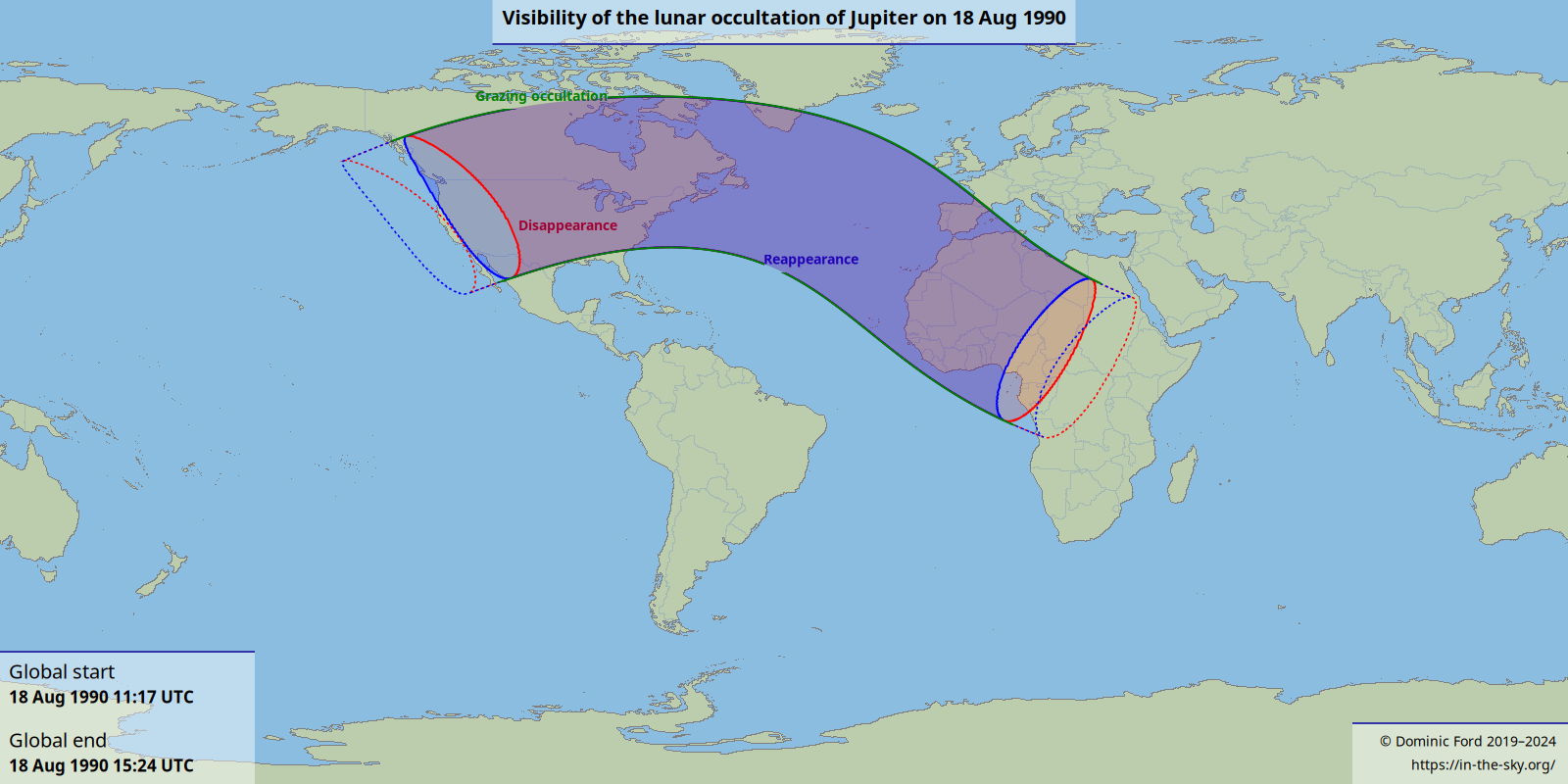The Moon will pass in front of Jupiter, creating a lunar occultation visible from parts of the Americas, Africa and Southern Europe. Although the occultation will only be visible across part of the world – because the Moon is so close to the Earth that its position in the sky varies by as much as two degrees across the world – a close conjunction between the pair will be more widely visible.
The occultation will be visible from South El Monte. It will begin with the disappearance of Jupiter behind the Moon at 04:16 PDT, though at a low altitude of only -0.2 degrees, in the north-eastern sky. Its reappearance will be visible at 05:10 PDT at an altitude of 10.3 degrees.
The map below shows the visibility of the occultation across the world. Separate contours show where the disappearance of Jupiter is visible (shown in red), and where its reappearance is visible (shown in blue). Solid contours show where each event is likely to be visible through binoculars at a reasonable altitude in the sky. Dotted contours indicate where each event occurs above the horizon, but may not be visible due to the sky being too bright or the Moon being very close to the horizon.

Outside the contours, the Moon will not pass in front of Jupiter at any time, or is below the horizon at the time of the occultation. However, a close conjunction between the pair will be visible across much of the world.
The map can be downloaded in PNG , PDF or SVG format. A KMZ file , is also available, which can be opened in Google Earth to provide a higher resolution map.
The animation below shows the path of the occultation across the Earth's globe. The red circle shows where the Moon appears in front of Jupiter.
A complete list of the countries and territories where the occultation will be visible is as follows:
| Country | Time span (UTC) |
| Canada | 11:29–13:27 |
| The Contiguous United States | 11:17–13:03 |
| Algeria | 13:43–15:08 |
| Libya | 14:06–14:59 |
| Chad | 14:14–15:21 |
| Mali | 13:51–15:15 |
| Niger | 14:09–15:18 |
| Mauritania | 13:43–15:11 |
| Nigeria | 14:15–15:23 |
| Mexico | 11:17–12:06 |
| Spain | 13:28–14:33 |
| Greenland | 12:27–13:18 |
| Sudan | 14:21–15:14 |
| Morocco | 13:37–14:52 |
| Cameroon | 14:20–15:24 |
| Central African Republic | 14:24–15:24 |
| Ivory Coast | 14:17–15:18 |
| Republic of the Congo | 14:30–15:24 |
| Western Sahara | 13:38–14:59 |
| Burkina Faso | 14:11–15:18 |
| Gabon | 14:32–15:24 |
| Guinea | 14:11–15:13 |
| Ghana | 14:17–15:21 |
| Senegal | 14:00–15:08 |
| Tunisia | 14:03–14:42 |
| Egypt | 14:22–14:52 |
| Democratic Republic of the Congo | 14:28–15:23 |
| Portugal | 13:30–14:31 |
| Benin | 14:17–15:21 |
| Alaska | 11:49–12:18 |
| Liberia | 14:23–15:13 |
| Sierra Leone | 14:19–15:10 |
| Togo | 14:18–15:21 |
| Guinea-Bissau | 14:11–15:05 |
| France | 13:46–14:09 |
| Equatorial Guinea | 14:30–15:24 |
| The Canary Islands | 13:30–14:48 |
| Gambia | 14:08–15:04 |
| Cape Verde | 13:58–14:46 |
| Mallorca | 13:54–14:19 |
| Angola | 14:44–15:22 |
| The Portuguese Azores | 12:51–14:20 |
| Sao Tome and Principe | 14:34–15:24 |
| Menorca | 13:59–14:14 |
| Ibiza | 13:51–14:23 |
| Andorra | 13:55–14:06 |
| Saint Pierre and Miquelon | 12:04–13:22 |
| Melilla | 13:44–14:35 |
| Gibraltar | 13:39–14:33 |
| Madeira | 13:25–14:37 |
| The Savage Islands | 13:30–14:43 |
| Isla de Alborán | 13:43–14:33 |
| Islas Chafarinas | 13:45–14:35 |
Lunar occultations are only ever visible from a small fraction of the Earth's surface. Since the Moon is much closer to the Earth than other celestial objects, its exact position in the sky differs depending on your exact location on Earth due to its large parallax. The position of the Moon as seen from two points on opposite sides of the Earth varies by up to two degrees, or four times the diameter of the full moon.
This means that if the Moon is aligned to pass in front of a particular object for an observer on one side of the Earth, it will appear up to two degrees away from that object on the other side of the Earth.
At the time of the occultation, the Moon will be 0 days past new moon and will be 5% illuminated. Jupiter will disappear behind the illuminated side of the Moon and reappear from behind the unilluminated side of the Moon.
The position of Jupiter at the moment of the occultation will be as follows:
| Object | Right Ascension | Declination | Constellation | Magnitude | Angular Size |
| Jupiter | 08h09m40s | 20°23'N | Cancer | -1.8 | 0'31" |
The coordinates above are given in J2000.0.
Next/previous occultations
| « Previous | Next » | |||
| Visible from the Contiguous United States | Worldwide | Worldwide | Visible from the Contiguous United States | |
| 02 Apr 1983 | 01 Mar 1987 | Occultations of Jupiter | 15 Sep 1990 | 26 Mar 1998 |
| 14 May 1990 | 01 Aug 1990 | Occultations | 22 Aug 1990 | 08 Feb 1991 |
The sky on 25 Feb 2026
| The sky on 25 February 2026 | ||||||||||||||||||||||||||||||||||
|
69% 8 days old |
All times shown in PST.
|
|||||||||||||||||||||||||||||||||
Source
The circumstances of this event were computed using the DE430 planetary ephemeris published by the Jet Propulsion Laboratory (JPL).
This event was automatically generated by searching the ephemeris for planetary alignments which are of interest to amateur astronomers, and the text above was generated based on an estimate of your location.
Related news
| 24 Feb 1990 | – Jupiter ends retrograde motion |
| 29 Nov 1990 | – Jupiter enters retrograde motion |
| 28 Jan 1991 | – Jupiter at opposition |
| 30 Mar 1991 | – Jupiter ends retrograde motion |
Image credit
The Moon in conjunction with Venus and Jupiter, with the Very Large Telescope in the foreground. Image © Y. Beletsky, ESO, 2009.


